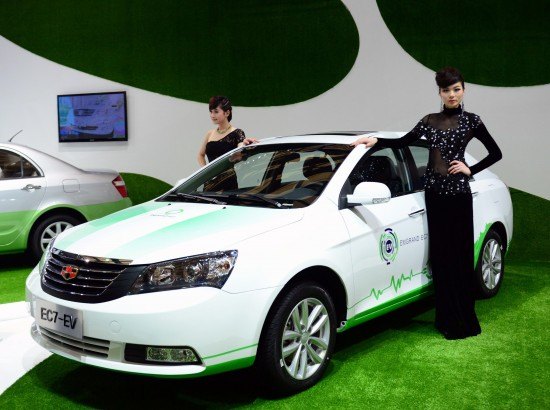Geely & Detroit Electric Announce Strategic Partnership to Produce Chinese EVs, Will Detroit Electric Use Geely Gliders Too?

Earlier this month, when Detroit Electric revealed their first car, the Lotus based SP:01, the EV startup’s CEO, Albert Tam, said that the battery powered sports car is only the first of three cars that Detroit Electric will be introducing over the next year or so. Only 999 of the carbon fiber bodied SP:01 will be made but Tam said that next year Detroit Electric will be introducing two more mass market cars, a sedan and hatchback. Tam said that those cars will have Detroit Electric specific styling and interiors but will be based on gliders sourced from an existing auto manufacturer with final assembly being done in Michigan. At the time of the SP:01 reveal, Detroit Electric executives said that the vendor whose platform they’d be using was “in Asia”. They company also said that an announcement of a strategic partner would be made at the Shanghai Auto Show. I assumed that partner would be Chinese and that Detroit Electric would be announcing who their platform vendor for the sedan and hatchback would be. I was half correct.
Detroit Electric did announce a Chinese strategic vendor, Geely, but the announcement wasn’t that the privately owned company headed by ambitious Chinese industrialist Li Shufu is going to be providing Detroit Electric with gliders. Instead, Detroit Electric will be supplying Geely with technology for Geely’s luxury Emgrand brand to sell battery powered EVs for the Chinese market and also develop related electric drive components and systems. The first vehicle that will be the result of the strategic partnership will be the EC7-EV, based, not suprisingly, on the Emgrand EC7, a C/D segment family sedan. The car will be co-branded and wear a “Detroit Electric – Technology” badge that is engraved with the blue circuit board trace graphic that graces the fascia of the SP:01. Initial sales will be in the first quarter of 2014 and focused at businesses and government customers, with the companies predicting sales of 3,000 cars in the first 12 months, and 30,000 a year by 2016. Interestingly, at the press conference in Detroit, Albert Tam had forecast sales of Detroit Electric’s sedan and hatchback at 30,000 units by 2016.
The sales to public sector agencies is one of the paradoxes about doing business in China. At the Detroit reveal, Tam was adamant about Detroit Electric refusing to accept investments from government owned businesses and specifically referred to China. Unlike many Chinese car companies, Geely, as mentioned, is a private company. Still, and Bertel can correct me if I’m wrong, I understand that Geely is fairly dependent on sales to government entities in China.
The cars will be using Detroit Electric’s two speed high torque transmission and a joint-venture company will be set up near Geely’s Hangzhou headquarters to build that gearbox as well as other critical EV powertrain components and associated parts. Two different sized battery packs will be available on the EC7-EV, one with a 165km range, and one with a range of 258 km. A joint R&D team has been set to work on the electric motor, battery pack and associated thermal and charge management systems, as well as a “vehicle management system”, which I suspect is a variant of Detroit Electric’s SAMI smartphone based infotainment system.
Apparently, discussions between the two companies have been going on for three years. With that level of involvement and the use of the term “strategic partnership” I think it’s safe to assume that any jointly developed powertrain technologies will end up on the yet to be announced Detroit Electric sedan and hatch. I think it’s almost as safe to assume that those Detroit Electric cars will be based on gliders that are built in one of Geely’s six Chinese factories.
Ronnie Schreiber edits Cars In Depth, a realistic perspective on cars & car culture and the original 3D car site. If you found this post worthwhile, you can dig deeper at Cars In Depth. If the 3D thing freaks you out, don’t worry, all the photo and video players in use at the site have mono options. Thanks – RJS

Ronnie Schreiber edits Cars In Depth, the original 3D car site.
More by Ronnie Schreiber
Latest Car Reviews
Read moreLatest Product Reviews
Read moreRecent Comments
- Jrhurren Worked in Detroit 18 years, live 20 minutes away. Ren Cen is a gem, but a very terrible design inside. I’m surprised GM stuck it out as long as they did there.
- Carson D I thought that this was going to be a comparison of BFGoodrich's different truck tires.
- Tassos Jong-iL North Korea is saving pokemon cards and amibos to buy GM in 10 years, we hope.
- Formula m Same as Ford, withholding billions in development because they want to rearrange the furniture.
- EV-Guy I would care more about the Detroit downtown core. Who else would possibly be able to occupy this space? GM bought this complex - correct? If they can't fill it, how do they find tenants that can? Is the plan to just tear it down and sell to developers?




































Comments
Join the conversation
There is no paradox. EVs are not selling in China, despite $10,000 subsidies, the budgets for which are sitting unspent. Pretty much the only buyers are governments, which have to, and they only buy a few to be able to say that they are following orders. Only 11,375 electric cars of all types sold in China last year, a mere rounding error in a country that bought 19.3 million units in the same year. The Chinese government had planned for 500,000 electric vehicles by 2015 and for 5 million by 2020. When it became evident that these goals are unattainable, China’s State Council kept the goals in place in the final version of the “Energy-Saving and New-Energy Vehicles Industry Development Plan” announced last year, but in a face-saving move, included regular hybrid and fuel-efficient internal combustion engine vehicles in the total. However, the plan assumes that most of the 500,000 units would be bought by local governments. Even thestate-owned China Daily voiced doubts about the government’s plan, saying that this “overestimates local governments’ financial capability as well as their willingness to buy non-local products.” According to the state-controlled paper, “most cities have less than 100 units of electric or plug-in hybrid vehicles, and there are rarely any plans to accelerate the purchase volume.” It is smart not to invest a lot of money into a market that doesn't exist, and to buy the components for the Chinese quota cars from someone who desperately needs those sales. As far as EVs go, Geely is as dependent on government sales as any other maker. In the grand scheme of things, Geely is less dependent on government sales than for instance Audi, which sells around 10% of its cars to the government.
This arrangement sounds similar to the unconsummated one with Dongfeng reported in 2009.... And then there were those with Youngman, Zap, etc.